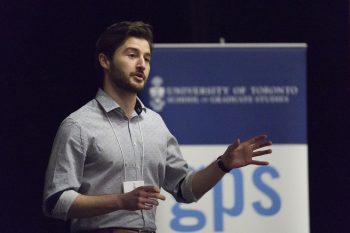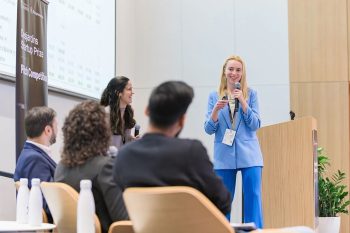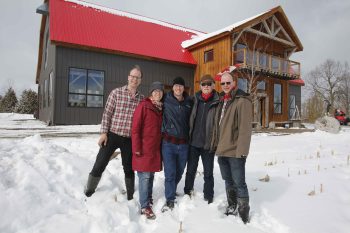With the Pan Am/ Parapan Am Games beginning in Toronto today, the U of T Engineering community is cheering on two of its own.
Donna Vakalis (CivE PhD Candidate) competes for Team Canada in the modern pentathlon and Sasha Gollish (CivE MEng 1T0, EngEd PhD Candidate) runs for Canada in the 1500m.
When they’re not training, Vakalis studies the impact of indoor building environments on public health and productivity under the supervision of professors Heather MacLean and Jeffrey Siegel (both CivE) and Gollish is one of the first students enrolled in the Faculty’s new Engineering Education (EngEd) program, supervised by Professor Bryan Karney (CivE).
U of T Engineering spoke to both athletes in the days leading up to the games to find out how they balance engineering and sport.
What has it been like since you found out you made Team Canada?
Gollish: It’s been a total rush for sure! But it only happened recently so I’m not even sure it has totally sunk in. My goal was to qualify for the Pan Ams, but my other goal was to run fast. So I’ve been travelling a lot and continuing to compete.
Vakalis: I’ve been focused on world championships, which just happened last weekend, in Germany. It may sound like a lot all at once, but it’s actually useful because it’s a little tricky to peak twice in a year. You don’t want them too far apart, or right on top of each other, but two weeks is actually perfect.
Let’s talk about what it took to get here. When did you decide that you were going to go for it?
Gollish: Last summer I was competing in Leuven, Belgium, in a series that is basically like the Belgian Cup. I ran a 4:13 and I thought, hey, if I can run that now, I wonder what I can run next summer.
Vakalis: The fall after I competed [at the Olympics] in London, I started school. At that point I thought it might be time to retire, because it just requires a lot of energy in addition to being a full-time student. However, I surprised myself and learned how to be even more efficient with my time. At the beginning of this school year I found myself being really fit and eager to compete. I had to make a choice, am I going to go for it or not? I made that choice, and my supervisors fortunately were supportive. The goal of this whole season has been to qualify for Pan Ams.
When did you realize you actually had a shot?
Gollish: It wasn’t until I ran at Harry Jerome, part of the national series which was June 9 in Vancouver. The rankings were really tight and I was sitting in third position. There just weren’t that many fast races in North America, and I was trying to really push my boundaries. Plus there are a lot of awesome middle-distance runners right now in Canada: Kate Van Buskirk, Hilary Stellingwerff, Sheila Reid, Nicole Siffuentes. It could have been any two of us that were named to that team.
Vakalis: I was at a world cup in Rome in April. Because of how our qualification system works, they take our top two scores from last year’s world championships and the four world cups. At the moment I crossed the finish line in Rome, I knew I had done what it takes to qualify.
Why did you choose to do graduate studies at U of T?
Gollish: U of T is a pretty awesome engineering school to get into. It’s also got a phenomenal running program, and my coaches are the varsity coaches, so it’s a natural fit.
Another reason was my supervisor, Bryan Karney. We met a few years ago, and we share a passion for the science, the math. I call it the ‘Enginerd’ passion. My other background is coaching, so the Engineering Education (called EngEd) program is a really unique way to blend the skills of coaching and engineering.
Vakalis: There were multiple reasons. I knew I wanted to live in Toronto, and from doing my masters here, I knew U of T has a really strong school with a rigorous academic program. But I also care a lot about the people and atmosphere in the department. For me the single most important factor was meeting the professors and their students. Now, finishing up my third year I feel like I am part of a really smart, ambitious, supportive family.
Have you learned anything as an engineer that has affected your athletics, or vice versa?
Gollish: I take a very scientific approach to things, which I think is probably rooted in studying engineering. With running, there are a lot of fads that come and go, but I always look to see what the science says.
There’s also the whole efficiency game. I’m always trying to be efficient with my time, and maximize it, to use a calculus term. It’s not necessarily about doing more with less effort, but asking how can I get the most out of each day
Vakalis: There are so many connections if you are willing to think analogically. For example, as an athlete you can start to see connections between the structural properties of materials and the way your body works. I was recovering from an injury earlier this year, and it was helpful to understand the mechanics of my body, in order to heal smarter and faster.
In the other direction, being a pentathlete who has to execute moves perfectly when an Olympic berth will be on the line, it helps to be able to think clearly under tremendous pressure. That’s helpful for standing up and teaching a class, or being able to answer a challenging question in front of your thesis defence committee.
What is it like to be competing on home turf in Toronto?
Gollish: Obviously it’s pretty cool. Most athletes don’t get that opportunity, but it also comes with a host of pressures. You’ve got all your friends and family who are super-stoked to come out and watch you, and there’s the feeling that you have to perform.
But you don’t. At the end of the day, they know how hard you worked, they know how dedicated you are. If it doesn’t go that well they still love you.
Vakalis: In modern pentathlon, we’ve never had a world cup in Canada, so this is a first in terms of the caliber of competition at home. Honestly, I don’t think I will even know how much it means until the day I compete. There are members of my family and really close friends who have never been able to watch me compete, who will be there in the stands next weekend.
When I think of them it’s a very acute and intense feeling, but I also feel a little bit of that same feeling about the whole community. Having U of T students and Torontonians around, and being able to share with them something that is a big part of my life, and is really important to me. It feels really special, because it is.
These interviews have been edited and condensed.



